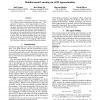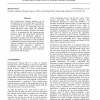226 search results - page 4 / 46 » Linear Bayesian Reinforcement Learning |
161
click to vote
Publication
We state the problem of inverse reinforcement learning in terms of preference elicitation, resulting in a principled (Bayesian) statistical formulation. This generalises previous w...
237
click to vote
Publication
We generalise the problem of inverse reinforcement learning to multiple tasks, from multiple demonstrations. Each one may represent one expert trying to solve a different task, or ...
127
click to vote
ICML
2006
IEEE
16 years 3 months ago
2006
IEEE
Reinforcement learning (RL) was originally proposed as a framework to allow agents to learn in an online fashion as they interact with their environment. Existing RL algorithms co...
123
Voted
AAAI
2010
15 years 3 months ago
2010
This paper introduces a principled approach for the design of a scalable general reinforcement learning agent. This approach is based on a direct approximation of AIXI, a Bayesian...
132
click to vote
ICML
2000
IEEE
15 years 6 months ago
2000
IEEE
The reinforcement learning problem can be decomposed into two parallel types of inference: (i) estimating the parameters of a model for the underlying process; (ii) determining be...


